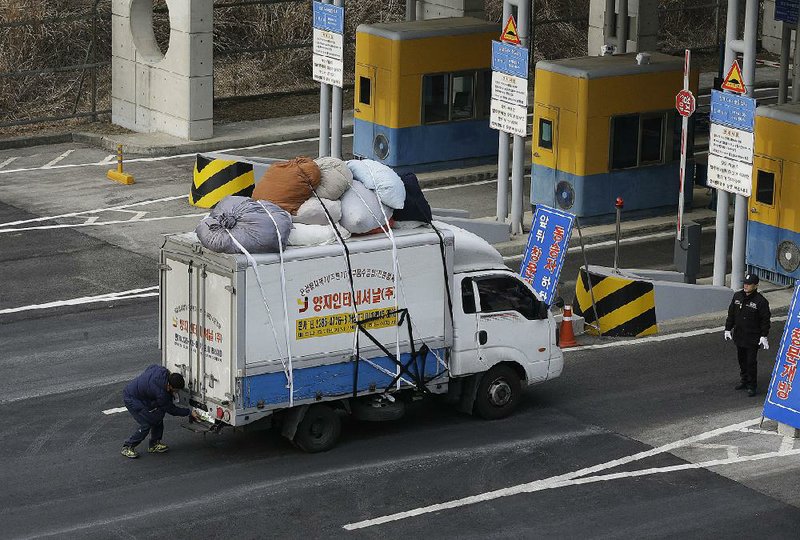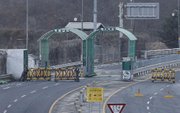PAJU, South Korea -- North Korea on Thursday ordered a military takeover of a factory park that had been the last major symbol of cooperation with South Korea, calling Seoul's suspension of operations at the jointly run facility a "dangerous declaration of war."
North Korea said it was responding to Seoul's shutdown order by immediately deporting the hundreds of South Koreans who work at the complex just across the world's most heavily armed border in the city of Kaesong.
The North also was pulling out the tens of thousands of North Korean employees, freezing all South Korean assets tied to the city and shutting down two crucial cross-border communication hotlines.
South Korea's action was "a declaration of an end to the last lifeline of the North-South relations" and "driving the situation in the Korean Peninsula to the brink of a war," said a statement from the Committee for the Peaceful Reunification of Korea, a North Korean government agency in charge of relations with the South.
"The South Korean puppet group will experience what disastrous and painful consequences will be entailed by its action," it said, calling the South Korean president, Park Geun-hye, "a traitor for all ages."
Hours after a deadline set by North Korea passed, South Korea's government said all of the 280 South Korean workers who had been at the facility had returned to the South.
Early this morning, the South cut off power and water supplies to the complex.
Tensions have risen since North Korea claimed a successful nuclear test last month, followed by a long-range rocket launch on Sunday that international observers see as a banned test of ballistic-missile technology. South Korea responded Thursday by beginning work to suspend operations at the factory park, one of its harshest possible punishment options.
"I was told not to bring anything but personal goods, so I've got nothing but my clothes to take back," a manager at a South Korean apparel company at the complex, who declined to give his name, said by phone before he crossed to the South.
Chang Beom Kang, who has been running an apparel company in Kaesong since 2009, said from South Korea that his company has about 920 North Korean workers -- who didn't show up on Thursday -- and seven South Korean managers at Kaesong.
He said one of his workers, who entered Kaesong earlier Thursday, was about to cross the border to return to South Korea with thousands of women's clothes produced at the factory. But at the last minute the employee had to drive back to the factory to unload the clothes because of North Korea's announcement that it would freeze all South Korean assets there.
"I'm devastated now," Kang said by phone, saying he's worried about losing credibility with clients because of the crisis.
Yonhap news agency, citing an unidentified military official, reported that South Korea bolstered its military readiness and strength along the western portion of the border in the event of a North Korean provocation. The report didn't elaborate on what that meant. Seoul's Defense Ministry would only say that its military has been on high alert since the North's nuclear test last month.
Seoul said its decision on Kaesong was an effort to stop North Korea from using hard currency earned from the park to pay for its nuclear and missile programs.
A group of people braved the rain for hours on the southern side of a cross-border bridge on Thursday anxiously waiting for their family members and co-workers to return to South Korea.
"I don't think I want my husband to ever work in Kaesong again," commented a woman who declined to give her name but said her husband was a manager at Taesung, a maker of cosmetics products.
"Whenever the North does something provocative, we worry about our loved ones," she said.
Kim Nam-sik, who heads South Korea's management body for the Kaesong park, told reporters at the bridge that the homecoming process was complete at 11:05 p.m., more than five hours after the North's deadline. The Unification Ministry said South Korea cut off its supply of electricity to the park as of 11:53 p.m.
Kim said it took longer for the South Koreans to withdraw because many were forced to leave manufacturing materials and other important items they initially planned to bring back.
The factory park, which started producing goods in 2004, has provided $560 million in cash to North Korea, South Korean Unification Minister Hong Yong-pyo said.
South Korean businesses with factories at the park reacted with a mixture of disappointment and anger. In a statement, the association of South Korean companies at Kaesong denounced Seoul's decision as "entirely incomprehensible and unjust."
The assets North Korea vowed to freeze in Kaesong included $852 million worth of investments South Korea poured into factories, roads and other facilities there, as well as millions of dollars' worth of finished goods that the South Korean factory managers now cannot bring home.
Information for this article was contributed by Ahn Young-joon, Hyung-jin Kim, Youkyung Lee, Foster Klug and Kim Tong-hyung of The Associated Press and by Choe Sang-hun of The New York Times.
A Section on 02/12/2016


